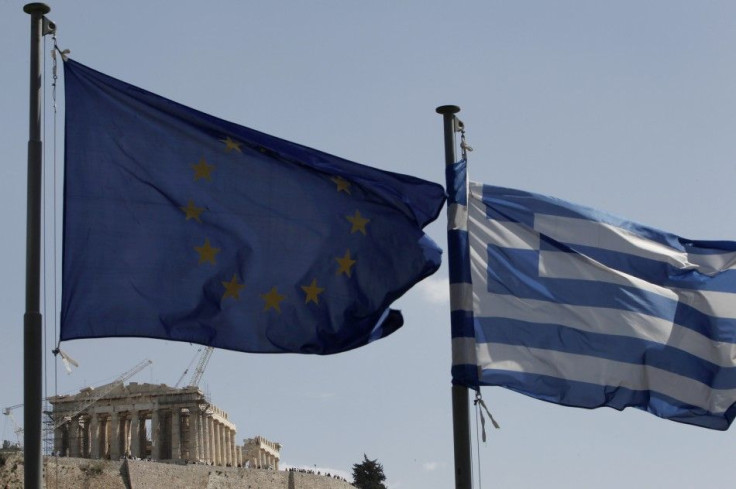The Crisis in Greece: A Personal View

Greece has undergone social, political and financial upheavals as the country’s huge debt crisis prompted the European Union (EU) and International Monetary Fund (IMF) to compel the country to impose draconian budget cuts and austerity programs in exchange for billions on euros in bailout cash.
The price for that “rescue” has been extremely high -- the government of Prime Minister George Papandreou is on the verge of collapse, while the Greek public is outraged by high unemployment, higher taxes and pension cuts, among other measures.
International Business Times spoke to a Greek native for her personal view on the crisis.
Eleni Athanatos is a research strategist at Omnivest Research in Princeton, N.J.
IB TIMES: Although Greece is considered the “cradle of Western civilization,” given the country’s distance from Western Europe and the centuries of domination under Ottoman Turkish rule, do modern-day Greeks feel they are “European” – culturally and even ethnically?
ATHANATOS: Greeks in general do not feel “European.” Each of the Eurozone countries has their own distinct culture and unique ethnicity, but Greece has more strongly grounded beliefs about their differences with other European countries.
IB TIMES: How, if at all, does modern Greek society and culture differ from the so-called “Anglo” countries like Britain and Germany?
ATHANATOS: The society and culture of Greece is very different from that of Britain and Germany. The Greeks hold greater value in the quality of life than in, for example, the prestige of a job. The Greeks love to express their opinions openly, which is not the style of the typical German. Demonstrations in Greece are truly a way of life and are not considered “rioting” in the streets.
The Greeks love the freedom to express their political point of views.
IB TIMES: Do Greeks of today feel that the powerful nations of Western Europe (France, U.K., and Germany) are “bullying” them in a chauvinistic manner with respect to the EU/IMF bailout and austerity program?
ATHANATOS: Yes, they do feel that way, especially with respect to Germany. Greeks feel that there is an “economic world war against them” and that they are being mostly attacked by the Germans.
Most “Anglo” countries view Greeks as lazy. We are not.
We have a different priority on the quality of life that we choose to live. Simpler is better to a typical Greek.
IB TIMES: Do you think most Greeks regret having joined the Eurozone, or do they feel it’s important to remain in it?
ATHANATOS: No they don’t regret having joined the Eurozone. They believe it was a very good choice they made to get in the euro. Most, if not all, Greeks strongly feel that they should never go back to the old drachma currency as it would be detrimental to their country.
IB TIMES: Did Greek immigrants who moved to places like U.S., U.K. and Australia experience significant prejudice and discrimination?
ATHANATOS: I would say the first-generation immigrants would have felt some prejudice and discrimination in those countries, but not so much for the second generation. However, Greeks in Germany have likely suffered discrimination -- whether they are first or second-generation immigrants.
IB TIMES: Greece and Turkey are historic enemies – does Greece support or reject Turkey’s bid to join the EU?
ATHANATOS: Yes they have been historic enemies but as Greece becomes more modern the relationship between these two countries is not as bad as people think.
Greece would embrace Turkey joining the euro because that way the EU will be more united and Greece would not have to incur expenses such as missiles to protect them from Turkey, etc.
Also, they wouldn’t want any retaliation from the rest of Europe if they rejected Turkey.
IB TIMES: How does the Greek Orthodox Church differ from the Roman Catholic Church will respect to its beliefs and practices? Have these two churches healed their ancient conflicts?
ATHANTOS: The Roman Catholic Church and Greek Orthodox Church both believe in: “The Father, Son and Holy Spirit”. However, we (the Greek Orthodox Church) believe that the “Holy Spirit” comes from the “Father” only. The Catholic Church believes that the “Holy Spirit” comes from both the “Father” and the “Son”. I don’t think those differences will be resolved any time soon.
IB TIMES: Is it fair to say that modern Greece has been a democracy only since 1974 (after the military generals were deposed)?
ATHANATOS: Yes, that’s fair to say.
IB TIMES: Even though the Communists in Greece were defeated in the civil war of the late 1940s, hasn’t the Socialist governments (i.e. Papandreou and his father) espoused strident anti-U.S. rhetoric?
ATHANATOS: Not really. In general, Papandreou and his father have been friendly towards the U.S. But even though some Greeks are anti-American, Papandreou’s father was a very persuasive speaker and knew how to manipulate his people by giving them what they wanted in the form of pensions, benefits, etc.
That resulted in Greeks being less interested or concerned with foreign policy.
© Copyright IBTimes 2024. All rights reserved.





















